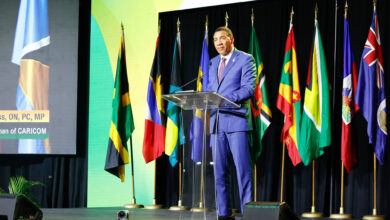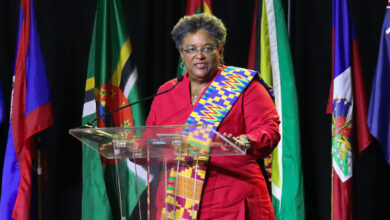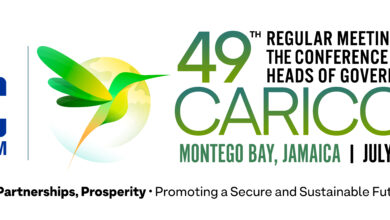It is always a pleasure to welcome representatives of CARICOM Member States to the Community’s Headquarters here in Georgetown. It is especially so today because you represent an interest group which is in a key position to influence both the direction and the pace of future development of our Region. Coming as you do from Government Information Services, regional media houses, non-governmental organisations and private sector bodies, you also represent major stakeholders in this business of regional integration. We are, therefore, very pleased to have you here to bring your perspectives to bear on the work of CARICOM and to discuss and agree with you on joint strategies for supporting the priorities of the Community
The foremost priority – and the main reason for our gathering today – is the establishment of the CARICOM Single Market and Economy (CSME). In a recent address, Prime Minister Arthur of Barbados, the Prime Minister with lead responsibility for the implementation of the CARICOM Single Market and Economy, emphasized that our greatest hope for economic survival and prosperity in the Caribbean rests on the dismantling of the barriers which have historically stood in the way of the free movement of capital, enterprise, ideas, people and services within our region, and the harmonisation to the extent possible of our economic policies and initiatives at all levels and in all spheres of Caribbean economic endeavour.
He also stressed the fact that we live in a world where such barriers are being progressively dismantled globally either through international trade agreements or the march of technology, and it would be sheer absurdity for us to dismantle those barriers with the rest of the world, but keep them in place, among ourselves, in the Caribbean Region.
Therein lies the underlying philosophy, and indeed the greatest case for creation of the Single Market and Economy. Similarly, the same argument underscores the urgent need to establish a Caribbean Court of Justice as an important adjunct to the Single Market not only as final arbiter of the Treaty of Chaguaramas, but perhaps more fundamentally, to move the Region further towards full political sovereignty and independence.
As you know, the creation of the Single Market and Economy is being effected at the legal and administrative levels through the completion of the nine protocols which were crafted to amend the Treaty of Chaguaramas. This process of creation is nearing completion, giving effect to the Single Market which is being created; the challenge which is upon us at this time.
Giving effect to the Single Market is not a process that can take place in technical meetings or round the negotiating table. Technicians or the political directorate, even with the best of intentions, cannot make the Single Market work. This requires the full support and participation of the people of the Region – participation and support which can only come through a belief in the process which is rooted in an understanding of the benefits and possibilities as well as the opportunity costs of the Single Market and Economy.
Without the support and participation of the people of the Community there will be no effective Single Market or Economy, no Caribbean Court of Justice. They will exist, but on paper, and in principle, and have no positive impact on the people of the Region. What is required is the transformation of the Single Market and Economy from abstract concepts into real life events and opportunities by and for the ordinary person.
That is why the Conference of Heads of Government has called for a strong public education programme (PEP) to support the CARICOM Single Market and Economy, for only such a broad-based approach, as envisaged through this collaborative network, can make the Single Market and Economy meaningful to the ordinary person.
This is why, at the Regional Consultation on the Single Market and Economy which took place in Barbados last week, there was a call for greater regional focus on the PEP, and for it to be seen as the responsibility of all stakeholders for execution by collaborative effort.
This is also why you are here today. You are the chief means through which the Single Market and Economy can be brought and made real to the people of the Region.
The CSME Public Education Programme which was launched in 1995 has concluded its first phase, with a full-scale launch of Phase II planned for the first quarter of 2001. During your deliberations over the next two days, you will have the opportunity to assess the impact of the first phase and help, by your inputs, to prepare a strategic action plan for Phase II. You will also have the opportunity to make contributions to the public education programme in support of the Caribbean Court of Justice.
As you discuss these processes, it may be instructive to consider the implications of what if no CARICOM Single Market and Economy … what if no Caribbean Court of Justice . . . what if we do not take this action now. You will have ample opportunity to ask the questions you need answered and I urge you to do so. It is understood that to play the role of bringing the Single Market and Economy to the people of the Region, you yourselves must understand and feel comfortable with the process, the benefits and opportunity costs.
I urge you to seize the opportunity to make your inputs during the next few days of discussion. I also urge you to demand further opportunities constantly thereafter. Let us, hear from you as often as is necessary for you to be able to play your role in this joint endeavour. And give us the good news as well as the bad. It is only in this way that we can advance the vision of the Single Market and Economy and make it real for the people of the Region. Let us over the next two days voice our opinions, brainstorm the issues, make alliances and set a framework for the most effective public education programme to date in the history of the CARICOM Region. The success of the Single Market and Economy may well depend on how well we do this work. Together we have the skills and resources to rise to the challenge.





